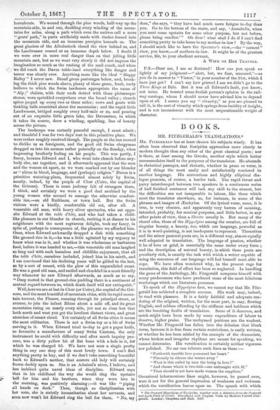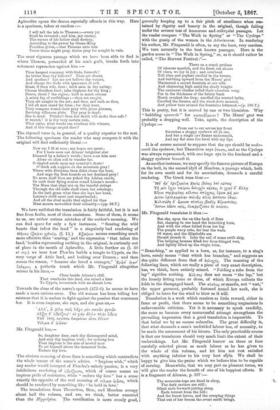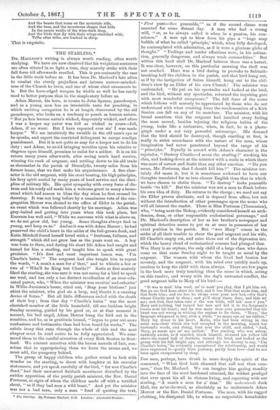BOOKS.
MR. FITZGERALD'S TRANSLATIONS.*
MR. FITZGERALD has at least chosen his subjects wisely. It has often been observed that Euripides approaches more closely to modern thought than any other of the great classical poets ; nor is there, at least among the Greeks, another style which better accommodates itself to the purposes of the translator. He abounds in rhetorical passages, and rhetoric, whether in prose or verse, is. of all things the most easily and satisfactorily rendered in another language. His sententious and highly elliptical dia- logue presents, of course, a harder task. The rapid thrust an& parry interchanged between two speakers in a continuous series of half finished sentences will task any skill to the utmost, but. the difficulties are not insuperable to labour, like those which meet the translator elsewhere, as, for instance, in some of the phrases and images of /Eschylus. Of the lyrical verse, some, it is. true, is very obscure, and apparently very barren of meaning, intended, probably, for musical purposes, and little better, in any other points of view, than a libretto usually is. But many of the choral odes, those of the Hippolytus among the number, are full of singular beauty, a beauty, too, which our language, powerful as it is in word-painting, is not inadequate to represent. Theocritus and the minor pastoral poets are, in a different way, almost equally well adapated to translation. The language of passion, whether it be of love or grief, is essentially the same under every form ;. and the description of natural beauty, in which these poets are. peculiarly rich, is exactly the task with which a writer capable of using the resources of our language will feel himself most able to cope. We have often wondered why, in the present rage for translation, this field of effort has been so neglected. In handling. the gems of the Anthology, Mr. Fitzgerald compares himself with many predecessors who have produced some of the most felicitous renderings which our literature possesses.
To speak of the Hippolytus first, we cannot say that Mr. Fitz-- gerald has achieved a complete success. His work may, indeed,. be read with pleasure. It is a fairly faithful and adequate ren- dering of the original, written, for the most pert, in easy, flowing English, and seldom offending by the stiffness and baldness which are the besetting faults of translation. Some of it deserves, and much might have been made by some expenditure of labour to deserve, higher praise. The unrhymed portions are the weakest. Whether Mr. Fitzgerald has fallen into the delusion that blank verse, because it is free from certain restrictions, is easily written, or whether he has been misled by the example of the dramatists, whose broken and irregular rhythms are meant for speaking, we- cannot determine. His versification is certainly neither vigorous. nor polished. No ear can tolerate such lines as these :- "Forthwith terrible love possessed her heart." "Piteously in silence she wastes away"
"What is this called by men the being in love ?"
"And shame which is two-fold—one nnfraught with ill." "Thou should'st not have made women the suppliers."
Occasional inharmonious lines might, however, be passed over,. were it not for the general impression of weakness and rudeness which the versification leaves upon us. The speech with which
• The Crowned Hippolytus of Euripides, together with a &Wiwi from Me Pastoral and Lyric Poets of Greece. Translated into ZuglIsh Verse by Maurice Purcell Fitz-- gonad. Louden: Chapman and Ha. 1d67.
Aphrodite opens the drama especially offends in this way. Here is a specimen, taken at random:— I will tell the tale to Theseus ;—every jot Shall be revealed ; and him, any enemy, The curses of his father shall destroy, According to the power by Ocean-King Poseidon given,—that Theseus unto him Three times might pray, thrice pray for nought in vain.
The most vigorous passage which we have been able to find is where Theseus, persuaded of his son's guilt, breaks forth into vehement reproaches against him :— Thou keepest company with Gods, forsooth ! As better than thy fellows ? Thou art chaste, And spotless? Let me not believe thy vaunts, And charge the Gods with ignorance of evil. Boast, if thou wilt, then ; trick men in thy eating; Choose bloodless food ; take Orpheus for thy king ; Dance, shout i' the orgies ; hold in much esteem A misty fog of scribblings ;—thou art caught, Thou art caught in the act; and thee, and such as thee, I bid all men stand far from ; for they hunt, They compass round their prey with pious phrases, Devising villanous plots. Thy prey is dead ; She is dead. Thinks't thou her death will make thee safe ?
0 wretch ! it is thy very certain ruin. What oaths, what words can overbear this witness, And of this charge acquit thee?
The rhymed verse is, in general, of a quality superior to the rest. The following specimen the reader who may compare it with the original will find sufficiently literal :—
Now am I ill at ease ; my hopes are spent ; For I have seen our Athens' brightest star Dimmed by a father's wrath ; have seen him sent
Alone on alien soil to wander far.
0 rippled sands upon my country's shore 0 thick oak coppice on the mountain grey ! Where with Dictynna thou didst chase the boar, And urge thy fleet hounds on her destined prey! No more shall thou see yoked thy Adrian steeds, Or curb their flying course round Limna's meads ; The Muse that slept not on the tuneful strings Through the old halls shall cease her echoings; In the lush grass what time she lays her head, Latona's child must rest ungarlanded; And all the rival maids that sighed for thee Must mourn unwedded their calamity.—(pp. 56-7.) We have said that the translation is fairly faithful, but it is not free from faults, most of them omissions. Some of them, it seems to us, are rather serious mistakes of the author's meaning. We can find space for only a few instances. "Scaring the wild beasts that infest the land" is a singularly bad rendering of
eipag 4aipei x0o6c. (1.11.) naiperv means something much more effective than scaring,' and the expression 'that infest the land,' besides representing nothing in the original, is curiously out of place in the mouth of Aphrodite. A little further on (I. 30 et seq.) we hear how Ph m-lra builds a temple to Cypris, on the very verge of Attic land, and looking over Trcezen ; and then comes the reason, "because she loved a stranger," 'EptV iptur? Wv.or, a pathetic touch which Mr. Fitzgerald altogether misses in his lines,—
Close beside Athene's cliff, That overlooks this land, she raised a lane To Cypris, lovestruck with an absent love.
Towards the close of the nurse's speech (473-6) he seems to have made a more serious error. The old woman has been telling her mistress that it is useless to fight against the passion that consumes ker. It is even impious, she says, and she goes on,—
cr, 9:an -za7, AV ppeuto Aijov ii3pIou;' oi yap ax%0 rXi.w ligpfg Teta' iorI, xpEiaew basiu,6uan, Elva, BiXEni• Tia,aa 13' iptocra.
Mr. Fitzgerald has,—
So, daughter dear, curb thy distempered mind, And stay thy impious wish; for nothing loss Than impious is the aim of mortal man To set himself above the immortal Gods. Endure thy love.
The obvious meaning of these lines is something which contradicts the whole tenour of the nurse's advice. "Impious wish," which any reader would interpret of Phmdra's unholy passion, is a very infelicitous rendering of figpitovatz, which of course means an impious pride of resistance, while "endure thy love" has a sense exactly the opposite of the real meaning of roxpez lpi;:gra, which should be rendered by something like ' be bold in love.'
The translations from Theocritus, Bion, and Moschus occupy
about half the volume, and are, we think, better executed than the Hippolytus. The versification is more evenly good,
generally keeping up to a fair pitch of oTeellence when sus- tained by dignity and beauty in the original, though failing under the severer test of humorous and colloquial passages. Let the reader compare "The Walk in Spring" or "The Cyclops" with the gossip of the women in the Adoniazuste. In rendering his author, Mr. Fitzgerald is often, to say the least, very careless. We turn naturally to the best known passages. Here is the garden scene in "The Walk in Spring," or, as it should rather be called, "The Harvest Festival :"— There on a couch profuse Of odorous mastic); and the fresh cut shoots Of vines, we lay in joy ; and overhead
Tall elms and poplars rustled in the breeze,
And bubbling upward from the Muses' grot Murmured a sacred fountain at our side.
And chattering high amid the shady boughs
The sunburnt cicades toiled their ceaseless song.
Far in the thickness of the briery bush Harsh croaked the frog; carolled the crested larks, Carolled the linnets, and the wood-dove moaned, And yellow bees around the fountains htfmmed.—(p. 106-7.)
This is pretty, but it is marred by one or two blemishes. Why "bubbling upwards" for mx.1-6/136/A,Eyoi, ? The Muses' grot was probably a dropping well. Take, again, the description of the
Cyclops :—
From ear to ear across-my front Stretches a shaggy eyebrow all in one, And but a single eye flames underneath, And my flat nose lies level with my. lips.
It is of course natural to suppose that the eye should be under- neath the eyebrow, but Theocritus says i'crseri, and so the Cyclops was always represented, with one huge eye in the forehead and a shaggy eyebrow beneath it.
As another instance, we may specify the famous picture of Europa on the bull, in the second idyll of Moschus, a passage which, both for its own merit and for its associations, demands a careful rendering. The Greek runs thus :—
'11d' ipet whim zvag gogoic vo'pring Tiju.ivi'2c00 railpou 60.1xby xipac, h zspl *us Ireppopiag ildLirou 'xac, '49pa Atj AsLot 'gpazulkivny TroXih"; cAbg cialrerov Lao*.
Ko7orcLon l'opoure crgqrhog 13a0t)g ELpaoreinc, `Iermy /airs smog, 0.appiesze bxoLipnv.
Mr. Fitzgerald translates it thus :- But she, upon the ox-like back of Zeus Sat, clasping in one hand the branching horn, And with the other folded from her lap The purple wavy robe, for fear the wash Of water, and the illimitable sea Should drench it. Like the sail of some swift ship, The bellying breezes filled her deep-fringed vest, And lightly lifted up the virgin form.
"Branching," as applied to a horn, as, for instance, to a stag's horn, surely means "that which has branches," and suggests an dea quite different from that of doXix6;. The meaning of the following lines, which are really a piece of very exact description, has, we think, been entirely missed. "Folding a robe from the lap" signifies nothing. Keavoc does not mean "the lap," but the loosely fitting tunic or dress, of which Europa collects the folds in the disengaged hand. The ais-Xog or mantle, not "vest," the upper garment, probably fastened round her neck, she is obliged to leave for the wind to blow as it will.
Translation is a work which receives so little reward, either in fame or profit, that there seems to be something ungracious in unfavourable criticism. Yet it is necessary to speak candidly, the more so because every unsuccessful attempt strengthens the prevailing impression that a good translation is impossible. To that belief we by no means subscribe. The great difficulty is, that what demands a man's undivided labour has, of necessity, to be made the amusement of his leisure. The only practicable course is that our translators should very much limit the extent of their undertakings. Let Mr. Fitzgerald bestow on three or four carefully selected pieces as much labour as he has given to the whole of this volume, and let him not rest satisfied with anything inferior to his very best style. We shall be happy to give him the praise which we believe him to be capable of earning. Meanwhile, that we may part on pleasant terms, we will give the reader the benefit of one of his happiest efforts. It is a fragment of .Alcman, p. 197 :- The mountain-tops are fixed in sleep, The dark ravines are still ; Silent each forward-jutting steep, Each torrent from the hill; And the forest leaves, and the creeping things That out of her bosom the swart earth brings, And the beasts that roam on the mountain side, And the bees, and the monstrous shapes that hide In the secret vaults of the wine-dark deep, And the birds that fly with their wings stretched wide, Tribe after tribe, are hushed in sleep.
That is eiquis. ite.
































 Previous page
Previous page